Chemistry: Fully Funded EPSRC DTP PhD Studentship: The Effect of Rotational Polarisation on Gas-Surface Reactivity
Swansea University - Chemistry
| Qualification Type: | PhD |
|---|---|
| Location: | Swansea |
| Funding for: | UK Students |
| Funding amount: | £19,237 p.a. |
| Hours: | Full Time |
| Placed On: | 13th December 2024 |
|---|---|
| Closes: | 24th February 2025 |
| Reference: | RS726 |
Key Information
Funding provider(s): EPSRC DTP
Subject area(s): Molecular beams, Surface science, Quantum-state resolved collisions
Project start date(s):
- 1 April 2025 (Enrolment open from mid–March
- 1 July 2025 (Enrolment open from mid-June)
Supervisors: Dr Helen Chadwick and Prof. Gil Alexandrowicz
Aligned programme of study: PhD in Chemistry
Project description:
Hydrogen is the most abundant molecule in the universe, and its interaction with surfaces plays a key role in a huge range of processes, from star formation to the safe storage of rocket fuel, to industrial catalysis and green energy production. The aim of this PhD project is to study hydrogen colliding with surfaces at a fundamental molecular level to gain unprecedented insight into the role that rotations play in gas-surface collisions.
The Surface Dynamics team, which includes researchers with both physics and chemistry backgrounds, has developed a Magnetic Molecular Interferometer (MMI) apparatus which can be used to control and manipulate the rotational orientation projection states of hydrogen molecules, which can classically be considered to correspond to whether the molecules are preferentially rotating like a helicopter or a cartwheel before they collide with the surface. The PhD project, which forms part of a Future Leaders Fellowship project (MR/X03609X/1), will explore whether changing the rotational orientation projection state of the H2 molecule affects the probability that energy is transferred between the molecule and the surface as well as the reactivity of the H2 with the surface.
This project will involve using and further developing both the experimental and data analysis methods that are currently used within the research team. The student will learn how to use the MMI apparatus, gaining knowledge of, for example, molecular and atomic beams, ultra-high vacuum systems, cryogenic technologies and a range of measurement and surface science techniques. They will also analyse the experimental data, developing techniques to extract information about the rotational orientation dependence of the gas-surface reaction, as well as performing numerical simulations to determine how best to perform the measurements to maximise the information that can be obtained.
Funding Details
Funding Comment
This scholarship covers the full cost of UK tuition fees and an annual tax-free living stipend in line with UKRI minimum rates (currently £19,237 for 2024/25).
Additional research expenses of up to £1,000 per year will also be available.
Advert information
Type / Role:
Subject Area(s):
Location(s):









